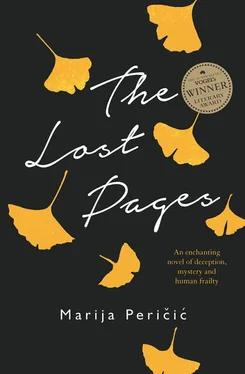When I turned into my street, I could see Elsa’s head protruding from the window of our house, and she waved when I came into view as though she had been keeping watch for me. By the time I had reached the house she was standing outside the entrance door. Sophie called my name from the window where Elsa had been earlier and waved at me as though I were returning home after a long absence.
It turned out that Jelen had been worried about my condition and intended to have someone accompany me home from the office, but I had left too quickly, so he had sent a messenger to my house to notify my family of my illness. The messenger was still there when I went up, one of the junior clerks. He looked relieved to see me and hurried off as soon as I had sat down.
I had planned to keep the incident of my collapse from my family, knowing they would worry and fuss over something that was really of no significance. Elsa and Sophie commandeered me as soon as the clerk had left. They made me lie down on the sofa and Sophie began bathing my forehead with a washcloth soaked in rosewater. I allowed them to tend to me, mostly because of the worried expression on Sophie’s lovely face.
These kinds of collapses had been a commonplace occurrence in my childhood, and had been the subject of endless speculation by doctors. I used to be afraid of the further illustration that they presented of my lack of control over my own body. I was afraid, too, of the reaction they provoked in others. The experience of the collapse itself was not especially worrying or unpleasant. It usually began with a sensation of sliding, a moment of vertigo, which was very much like the experience of being in a stationary train carriage and looking out of the window at the adjacent carriage of another train, also stationary, and then that other train slowly beginning to move, but feeling for a moment that it is one’s own train that is moving. After this sliding sensation, I was aware of nothing until I came to myself again. There was nothing in the interval that I could ever recall; only blackness. Yet I had always felt sure that something must happen to me in those parentheses of consciousness; surely I must go somewhere, in the same way that one visits dream worlds when asleep.
Lying on the sofa, breathing in the scent of roses from the cool cloth over my face, listening to Sophie’s and Elsa’s murmuring and the dulled street noises, I began to drift into sleep. Instead of Sophie’s face bending over me I imagined Anja’s, her eyes soft with concern, her hair falling a little over one shoulder. She smiled a slow smile, pulling me into sleep.
AFTER MY COLLAPSE, JELEN HAD INSISTED THAT I STAY AT HOME for a few days. The collapse had an oddly calming influence on my nerves, as if a circuit had been broken, and when I woke from a heavy sleep the following day it was to a state of tranquillity that I had not experienced for many months. Wakefulness came to me gradually, and I became aware of the world of my bedroom. Light pooled in through the window and I saw every object in the room anew. My ears detected a complicated arrangement of sounds, through which I constructed the idea first of the house, and then of the city as it gradually spread out around me; Elsa’s steps on the stairs, the sound of my own breath, a carriage passing in the street, the trilling of a kestrel, and a jackdaw singing a complicated response.
I smiled to myself and closed my eyes again. I found that now I could easily fix my mind on the idea of Anja and Franz without it continually slipping from my focus, as it had the day before. The previous day had been the first that I had not called on Anja since my return from Karlsbad, but I was surprised to feel no urgency about this. I wanted to drift off again into sleep, but a persistent sound of footsteps going up and down the stairs prevented me. This became joined by the hissing whispers of Elsa and Sophie, together with my mother’s voice, which spoke at the normal volume, only to be immediately shushed by the others.
I remembered then that it was my birthday, and a moment later the bedroom door slowly opened and Sophie, Elsa and my mother crept into my room. My mother began singing ‘Happy Birthday’ straight away in a loud voice, and the other two joined in. Sophie brought me a breakfast tray with flowers and cards and letters that had arrived in the morning post.
Cups of coffee were distributed and I began to look through my birthday letters. There was one from Felix, and Kurt, and of course Uta, whose was written in a pale violet ink. There was another letter from our cousin in Brünn and a very thick one from Berlin, addressed in handwriting I could not immediately identify.
Sophie clamoured for me to read some of the letters aloud, and I opened first the one from Brünn and read out the birthday wishes and news of marriages and births of the extended family and the activities of the summer.
While I was reading, the letter from Berlin was lying on my lap. Something about the writing looked familiar and made me feel uneasy. After a moment I realised that the writing looked like Anja’s. I continued mechanically to read aloud. I wanted to seize the Berlin letter and tear it open, but there were many pages still to come of detailed news from Brünn. My cousin Oskar was an amusing letter-writer, and my audience was laughing and exclaiming at the incidents he described. My eyes kept sliding to the Berlin letter. It suddenly seemed to possess an extraordinary weight that pressed down on me through the bedclothes.
At last I reached the final page of Oskar’s letter and my fingers were itching to take up Anja’s letter immediately, but it occurred to me that perhaps its contents might not contain birthday wishes that could be read aloud to my assembled family. I had not had any communication with Anja since before I was in Karlsbad. The envelope looked thick and heavy, suggestive of the emotional outpourings I had been both longing for and fearing.
At last I finished reading my cousin’s letter and reached out for the other letter, but Sophie announced that it was now time for me to open my birthday presents. She jumped up from the bed and ran out of the room. My mother immediately began a long-winded story from the time of my childhood. Her memory of this period was surprisingly unimpaired and she had a ready collection of anecdotes that she recounted in the smallest details. Her words fell about my ears, while all my attention was on the thick envelope in my fingers.
I had heard the story she told many times before; it concerned my brother, Otto. While she spoke I surreptitiously began to slide my finger underneath the envelope’s seal. With one hand, this was a difficult feat. The fibres of the papers gradually gave way to the pressure of my fingers and I felt the paper tear a small distance. I edged my finger further along, extending the tear with a timid, dry crackle that I covered by rustling the bedclothes around over my legs and shifting about in the bed. I continued to tear along the envelope in tiny bursts, striving for silence, pausing to give the appropriate responses to my mother’s tale.
When I had torn it completely open, I slid my fingers inside the envelope and felt about in the folds of tissue-thin paper that it contained, all the while keeping my eyes on my mother’s face, nodding attentively.
She had reached the end of the story, and in a rare expression of emotion, had stretched out with both hands to take my hand, the one entangled in the hidden envelope. I was forced to discard the envelope, and my hand was caught now in her grasp. She told me what a delightful child I had been, such strength, such promise. Every year at my birthday she told the same tales of Otto’s childhood, having mistaken me for him. I never had the heart to remind her that Otto was long dead.
Читать дальше












